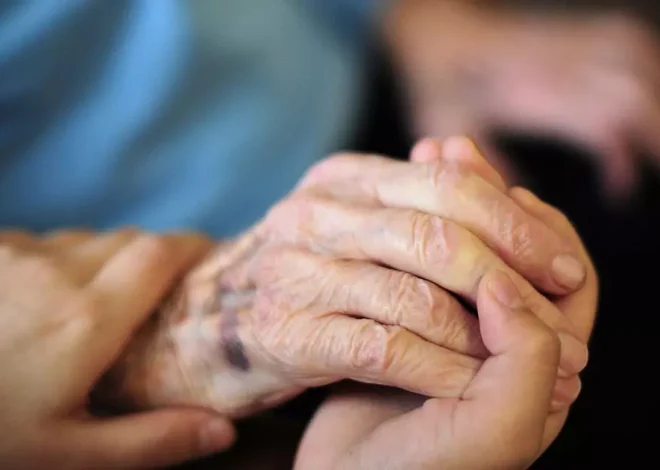
More staff, more time for patients
The situation in nursing is tense. More and more nurses are needed. At the same time, more and more nurses are leaving the sector or are absent for health reasons. We spoke to nursing union member Beatrix Eilitz about the everyday work of nurses and what politicians need to do to sustainably improve working conditions in nursing.
Contrast: I would like to start with a somewhat personal question. Recently my 53-year-old mother told me that she is afraid that she will not be able to get care in the future when she needs it because there is such a shortage of staff. Is this fear justified?
Beatrix Eilitz: Unfortunately, that is the case. There are already countless studies that say that there will be a shortage of around 20,000 nursing staff in the next few years. On the one hand, this is due to the wave of retirements among colleagues, i.e. the so-called baby boomer generation, and on the other hand, the population is getting older and therefore has a greater need for care.
“People are no longer the focus”
Contrast: You represent 3,300 nursing staff. What are the biggest challenges currently?
Beatrix Eilitz: I want to start differently. Working with people, whether they are children, old people, people in need of care or sick people, is wonderful and really fulfilling work. The problem is that colleagues have less and less time for those they care for. Hardly any time for conversations, hardly any time to go for a walk with them. Everything now has to be done every minute.
You only have numbers in the back of your head and are constantly under time pressure. People are no longer the focus. That is what bothers colleagues the most.
Because care is basically something very simple: I only need to treat others the way I would like to be cared for myself. But if no one has time for me, I will not feel comfortable. That is also one of the reasons why many colleagues say: “The way things are going at the moment, I cannot take responsibility for it.“ They then leave nursing and move into other professions.
The poor working conditions force many nurses into other professions, even though they would like to work in nursing. (Photo: freepik)
“I can’t handle this until I retire.”
Contrast: Why are there so few new nurses?
Beatrix Eilitz: There are countless initiatives, whether from providers, states or the federal government, to attract new employees. In Styria, we have the problem that there are too few training places, especially for qualified health and nursing staff. We have to find new people. That is beyond discussion.
What annoys me so much is that hardly any measures are being taken to retain current employees. The most important point here is fair pay. Second is more appreciation and more time. When I am looking after someone, the next five are already waiting. This is a problem for my colleagues and many say: “I won’t be able to handle this until I retire.”
A real care reform
Contrast: What political measures are needed now to get the situation in nursing under control again?
Beatrix Eilitz: Firstly, there are nine different federal states, nine different regulations. Nursing homes and hospitals also have different staffing ratios.
There should be uniform staffing ratios across Austria, based on scientific standards, so that colleagues have enough time to look after people in a comprehensive manner. It’s not just about keeping them fed, warm and clean – good care is more than that.
Secondly, politicians have already announced the major care reform several times. About two years ago there was a bonus payment. However, the majority of colleagues never received this bonus. The same was true of the extra week of holiday. Only a minimal percentage got this week.
When it comes to care, people often only talk about nursing homes and hospitals, but there are many more places where care is provided, such as day centers, facilities for the disabled, mobile care or assisted living. And it takes more than just nursing staff to make care work well. No matter how well the nursing staff do their job, if no one cleans the house or makes the food, there is no good care.
Nurses work not only in hospitals or inpatient facilities, but also in many other facilities such as assisted living or mobile care.
The cleaning staff, for example, often spend longer in the room than the nursing staff themselves. These professional groups are totally underestimated or overlooked. But they do just as excellent a job as their colleagues in direct care. In addition, there are nursing assistants, specialist nursing assistants, and also home helpers. Only all professional groups together can guarantee good care for the population in Austria.
Over 40 percent have burnout symptoms
Contrast: The Chamber of Labor recently published a study in which they analyzed the situation of employees in health and social professions in Styria. The result: 41 percent said they were suffering from moderate burnout symptoms and 5% from severe burnout symptoms. Why are the numbers so high?
Beatrix Eilitz: We did a similar study ten years ago. It is alarming that these burnout figures have increased. The reason is easy to explain. More and more time pressure, spending as much time as possible working with customers. In between, I have to plan for travel time. Then there are the discussions: “Why did you drive for five minutes? It will take three minutes.” There are also other activities such as documentation, shopping or meetings with colleagues. Is this time charged to the customer or is it added to extra time? This creates stress for the colleagues.
In addition, understaffing is becoming more and more common. If a colleague is on sick leave or on vacation, that has to be compensated. If someone is absent, someone else has to step in. If you don’t step in, you feel guilty because the colleague on duty then has to work even more or people are not taken care of. I think it’s almost irresponsible of politicians, but also of the providers, to leave colleagues alone with this situation. There needs to be sufficient staff and time resources so that employees can do good work for customers.
Lifting 100 kilos – heavy work in nursing
Contrast: Would you say that nursing is hard work?
Beatrix Eilitz: Definitely. I can remember how we built houses back then. In the 1990s, cement bags were reduced from 50 kg to 25 kg to protect the construction workers. In care, clients often weigh 80, 90, 100 kg. Of course, it is basically possible for two people to lift these people, but due to a lack of staff, this is often not possible. This means that colleagues then have to transfer the client from the bed to the wheelchair or from the wheelchair to the bathtub. You do this alone. But that is only the physical aspect, there is also the psychological aspect.
You are constantly confronted with illness, with challenging customers who of course have their wishes and needs that you have to respond to, relatives who want something. But you know that you cannot care for your customers the way you would like to. This is all a psychological burden. On top of that, if you drop a bag of cement or a brick on a building site, in the worst case scenario it will be broken. But if an elderly person accidentally falls down, then you not only have professional consequences, but in the worst case scenario the customer is in hospital and has broken something. You have to digest that, process it and keep that in the back of your mind.
Reconciling care and family
Contrast: How can you combine family life with a nursing career?
Beatrix Eilitz: Difficult. In stationary facilities, you would have a more regular work schedule if you didn’t have to step in all the time. In mobile services, it is much more difficult. The main care times there are in the morning, at lunchtime and in the evening. You hardly have a continuous shift.
Because we also mentioned pensions before: It would of course make sense for the female colleagues, who are mostly women, to be employed full-time so that they receive a pension that is somewhat sufficient to live on. But that is not feasible in practice. On the one hand, only part-time jobs are offered, and on the other hand, the female colleagues usually cannot manage this because they often have children or relatives to care for at home.
Many nurses suffer from the poor working conditions in nursing, both physically and psychologically. (Photo: freepik)
Then the argument often comes up: “Why don’t you increase your hours?” Many colleagues then say no, because they know from experience that if I’m employed for 20 hours, I have to work 30 or 35 hours. Then they’re afraid that they’ll have to work 35 or 40 hours if they increase their hours to 30.
How care should work
Contrast: What can society do to improve the situation of nursing staff?
Beatrix Eilitz: My vision is that we all, together with the employees, hold politicians accountable so that they finally act. I have been in this field for over 30 years. Countless promises have been made, but there has never been a major improvement, only small repairs. What is needed is a major strategic plan for care. How can care work so that the customers are well, but also the care workers so that they can retire healthy.
Contrast: So we are far from structural reform?
Beatrix Eilitz: Unfortunately yes.
Contrast: You see every day how difficult the situation is in nursing. What motivates you to keep fighting?
Beatrix Eilitz: I have two mottos. The first is: to achieve great things in small steps. The second is: those who fight can lose, those who don’t fight have already lost. There has been some progress in the last few decades.
My hope remains that the employees will finally stand together and say: “We will not allow ourselves to be treated like this. We expect more appreciation from politicians.”
For me, it would be more appreciative if politicians finally improved working conditions so that people can be well cared for in the future. So that your mother doesn’t have to worry about not getting the care she needs at some point.

Ethel Purdy – Medical Blogger & Pharmacist
Bridging the world of wellness and science, Ethel Purdy is a professional voice in healthcare with a passion for sharing knowledge. At 36, she stands at the confluence of medical expertise and the written word, holding a pharmacy degree acquired under the rigorous education systems of Germany and Estonia.
Her pursuit of medicine was fueled by a desire to understand the intricacies of human health and to contribute to the community’s understanding of it. Transitioning seamlessly into the realm of blogging, Ethel has found a platform to demystify complex medical concepts for the everyday reader.
Ethel’s commitment to the world of medicine extends beyond her professional life into a personal commitment to health and wellness. Her hobbies reflect this dedication, often involving research on the latest medical advances, participating in wellness communities, and exploring the vast and varied dimensions of health.
Join Ethel as she distills her pharmaceutical knowledge into accessible wisdom, fostering an environment where science meets lifestyle and everyone is invited to learn. Whether you’re looking for insights into the latest health trends or trustworthy medical advice, Ethel’s blog is your gateway to the nexus of healthcare and daily living.



